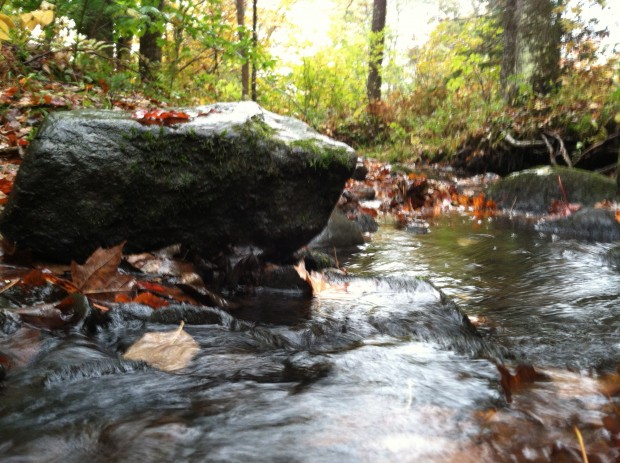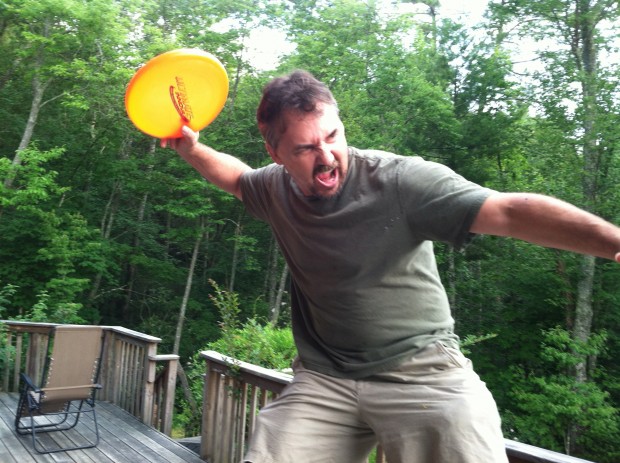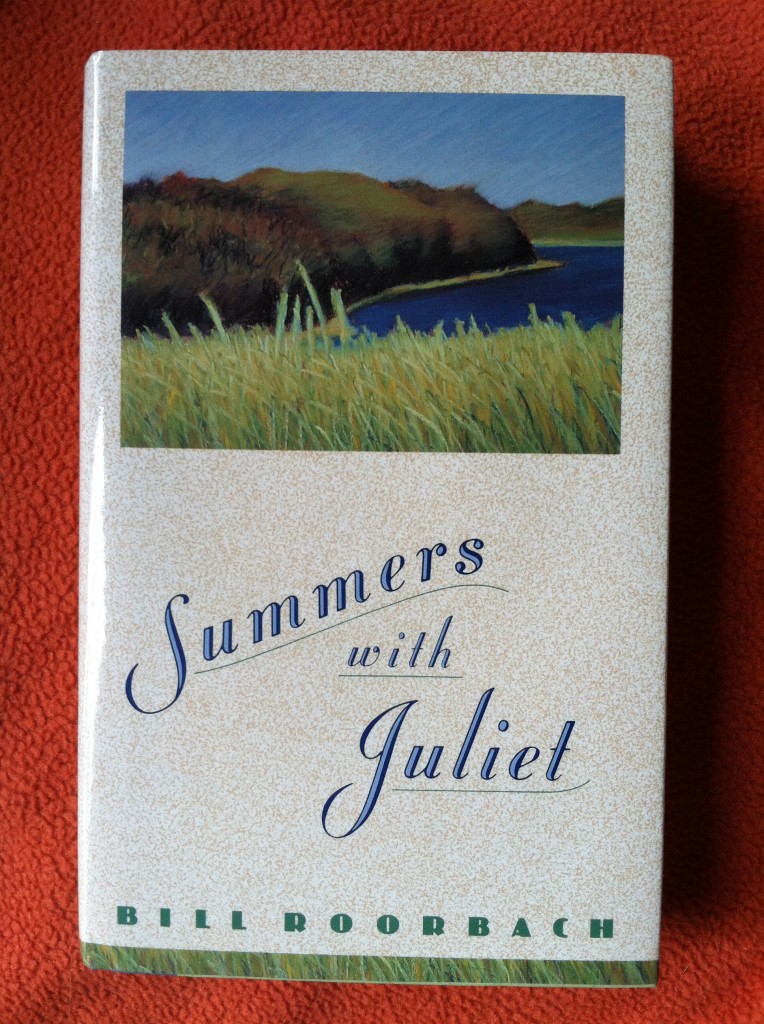Our Best American Essays
The Meal of a Lifetime
categories: Cocktail Hour / Guest Columns / Our Best American Essays
comments: Comments Off on The Meal of a Lifetime
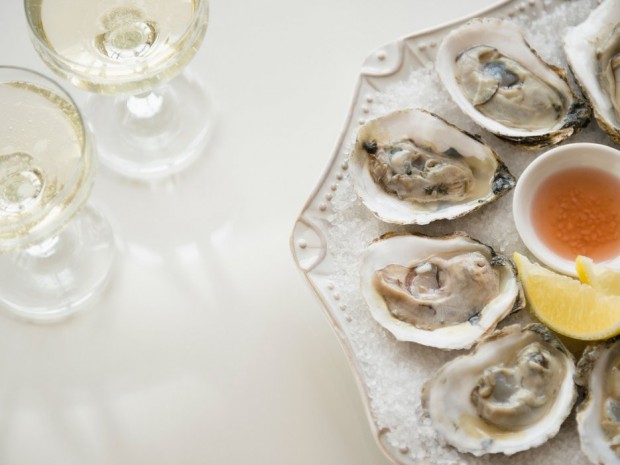
In August of 2010, Brendan and I lived at a three-week artists’ residency in southern Germany. “You’ll live in a castle,” the organizer who’d invited us had promised. So we arrived at the Schloss School, a former monastery turned castle turned boarding school, with visions of candlelit dinners in a grand medieval hall (at least I did) to find that we were to eat three meals a day in a side room of the school cafeteria, with no wine served, with thirty other artists from various countries. (We also slept in dorm rooms, in kiddie beds.) Continue reading →
Sixty by Sixty: A Meditation in Mosaic Upon the Sixtieth Birthday of the Haystack School of Arts and Crafts, and My Own
categories: Cocktail Hour / Our Best American Essays
comments: 2 comments
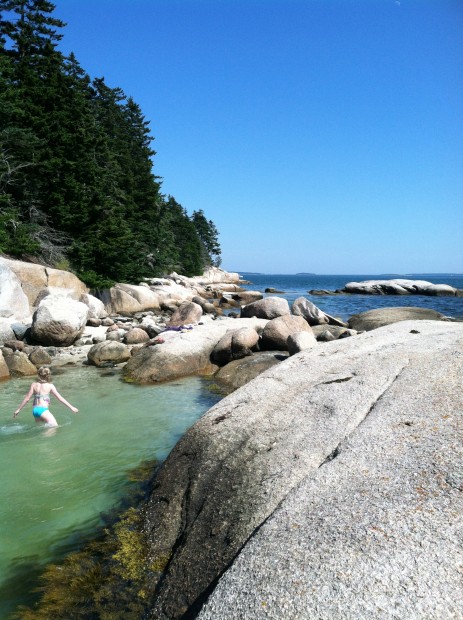
Elysia at Haystack, 2013
Prologue (in Sixty Words, Too: One to Grow On)
This essay is about the power of collaboration. Written in my sixtieth year, it’s a mosaic of sixty juxtaposed sections, each of exactly sixty words, a total of 3,600 tesserae, or assorted bits. The multiples may be read in any order, inviting readerly collaboration. Please number the boxes as you go to create a fresh path for others to follow. Continue reading →
Autumnal Equinox
categories: Cocktail Hour / Our Best American Essays
comments: 1 comment
In late August, more emphatically in September, the garden begins to die. First frost in our valley location is generally within a week or two of Labor Day, and follows the olden wisdom: beware the full moon. The first hard freeze (a full night at twenty degrees or lower–as opposed to mere frost) might wait till the next full moon, but then again, it might come any night at all, starting late August. One looks to the evening sky after a perfect, clear day as the stars emerge and can almost see the heat flying up and up and gone. The cold drops in. I throw old sheets over the tomatoes the way my elderly neighbor Isabel Hammond showed me before she died, pull a tarp over the basil and cover the cucurbits (cumbers, squashes, pumpkins). Some years I do nothing but mourn: you can’t stop winter. Continue reading →
Greatest Sportswriter of 2013? David Gessner!
categories: Cocktail Hour / Our Best American Essays / Reading Under the Influence
comments: 1 comment
.
USA Today has picked our own David Gessner’s essay “Ultimate Glory” as one of the greatest pieces of sportswriting for 2013. That puts him in great company, of course, and puts Bill and Dave’s Cocktail Hour on the list with ESPN.com and The New Yorker. Here’s the link, and now, here’s the essay: Continue reading →
Getting Outside Saturday: “Scioto Blues”
categories: Cocktail Hour / Getting Outside / Our Best American Essays
comments: 2 comments
[This essay is from my book Into Woods and originally appeared in The Missouri Review. Later, Harper’s picked up an excerpt for their “Readings” section. It was written in about 1998, and since then I’ve developed a much fonder feeling for Columbus.]
.
.
Scioto Blues
.
If you move to Columbus, Ohio, from Farmington, Maine, you will not be impressed by the landscape. It’s flat around Columbus and the pre-prairie rivers move sluggish and brown. In Maine you pick out the height of flood on, say, the Sandy River, by the damage to tree trunks and the spookily exact plane made by ice and roaring current tearing off the lowest branches of riverside trees. In Columbus you pick out the height of flood on the Olentangy or Scioto rivers Continue reading →
Vernal Equinox
categories: Cocktail Hour / Getting Outside / Our Best American Essays
comments: Comments Off on Vernal Equinox
Here is the equal night again, so different from that of autumn, which comes dressed in summer. In fact, the first day of spring comes to Maine in high winter drag. Often it comes dressed in snow, thick and wet, mixed with rain.
For me in March most of the pleasure in watching snow accumulate has fled. I decline to shovel the driveway, thinking, Snow’ll be gone soon enough, and pay for that when the slush left over freezes in deep ridges that last weeks in a cold snap. I consider the skis—but the snow is so wet and heavy, and I’ve been thinking about my bicycle, my hiking boots. Soon enough.
But, of course, it’s not soon enough. It’s weeks, sometimes, in grinding cycles of melt and freeze, and melt and freeze again. And again. Time never moves so slowly as in the transition from winter to spring in Maine. By March the mind’s night has got very long, and I have gotten used to it, gotten cozy alone in there, in my thoughts. Continue reading →
SUMMERS WITH JULIET is Twenty
categories: Cocktail Hour / Our Best American Essays / Reading Under the Influence
comments: 8 comments
Summers With Juliet started as an idea for a personal essay, one of my first ever (before that I’d only written formal essays and fiction), nothing more than this: My not-yet wife and I had seen an enormous fish in Menemsha Pond, Martha’s Vineyard, a sea sunfish, Mola Mola. One January day I started to write that story, and by late March, I finished it. After a year of revising and Continue reading →
A Letter to a Neighbor
categories: Our Best American Essays
comments: Comments Off on A Letter to a Neighbor
 You will be moving into your new home soon and, as ours is a small community, the neighborly thing for me to do would be to bring by a tin of cookies or fudge. Instead I send this letter. Cowardly by nature, I’ll probably slip it under your door. It’s not the sort of thing likely to elicit the smile brought on by a note from an old friend, or even the irritated glance aimed at junk mail, and you’ll surely toss it aside at some point. If I had the courage to stick around while you read my words, you’d no doubt turn to me and counter my own flimsy, idealistic arguments with more solid and practical ones. “What right do you have to tell me what to do with my land?” you’d ask. “I bought it with my own hard-earned money. Furthermore, if I hadn’t built my house here, the place would be checkered with subdivisions.”
You will be moving into your new home soon and, as ours is a small community, the neighborly thing for me to do would be to bring by a tin of cookies or fudge. Instead I send this letter. Cowardly by nature, I’ll probably slip it under your door. It’s not the sort of thing likely to elicit the smile brought on by a note from an old friend, or even the irritated glance aimed at junk mail, and you’ll surely toss it aside at some point. If I had the courage to stick around while you read my words, you’d no doubt turn to me and counter my own flimsy, idealistic arguments with more solid and practical ones. “What right do you have to tell me what to do with my land?” you’d ask. “I bought it with my own hard-earned money. Furthermore, if I hadn’t built my house here, the place would be checkered with subdivisions.”
You’d be right of course. And I should be grateful the land wasn’t further developed. But I’m an ingrate, and ingrates, by nature, complain.
“It’s a goddamn desecration of place,” another of your new neighbors said recently. That’s the word–desecration–that keeps coming up when I think of what you’ve done to your land. I don’t use the word lightly; in fact, I use it just as it was meant to be used.
Our Best American Essays: Shitdiggers, Mudflats, and the Worm Men of Maine
categories: Cocktail Hour / Getting Outside / Our Best American Essays
comments: 2 comments
Shitdiggers, Mudflats, and the Worm Men of Maine
by Bill Roorbach
.
.
.
“Hard work,” says Dicky Butts, and we haven’t even started yet.
. “Get wet today,” says Truman Lock. He pulls his greying beard, squints out over the bay. The blast of an offshore wind (strong enough to blow the boat and its no-lights trailer halfway into the oncoming lane as we made the drive over) is piling whitecaps, spraying their tops, Continue reading →
Getting Outside Saturday: Field Notes on My Daughter
categories: Cocktail Hour / Our Best American Essays
comments: 1 comment
 We moved from Cape Cod to Carolina about eight and a half years ago. I wrote this soon after our first school year in the South ended, when we returned to the Cape in June. It turned out we weren’t the only ones with a new baby and this is the story of how we interacted with another pair of parents and their off-spring. It was originally published in the great journal Isotope. Long may it live!
We moved from Cape Cod to Carolina about eight and a half years ago. I wrote this soon after our first school year in the South ended, when we returned to the Cape in June. It turned out we weren’t the only ones with a new baby and this is the story of how we interacted with another pair of parents and their off-spring. It was originally published in the great journal Isotope. Long may it live!
FIELD NOTES ON MY DAUGHTER
1. Fox
During these joyous days back on Cape Cod I am taking field notes on both the local foxes and Hadley. Hadley is now just over a year old, a completely different animal than the one who moved south: a walking, talking, gesturing hominoid. Last night she rode my shoulders to the beach, and we found that a fox family had built a den in the seawall rocks. Hadley pointed at them and said “cat,” the word she is stamping on everything these days. Still, if her term for them was not entirely accurate, she was close. The two kits, their legs covered with black stockings, ambled right up to us, and she could barely contain her excitement. Meanwhile, I tried to maintain my scientific sobriety, taking notes on their black eyes, their white-tipped tails, their foolish trust.
Hadley’s physical development, like those of chimps and apes, her closest relations among primates, is relatively slow compared to other animals, these foxes for instance. In humans, physical growth, height and size, is retarded because time is required for us to learn the complex, symbolic and ever-changing world of our species. But the mental growth is wild. You see it in Hadley’s eyes and her hands and in her intense interaction with the physical world. Not long ago I taught her how to snap, and now she moves around the house going at it like a Beat poet. Her prose poem of course is made up of that one obsessive word, “Cat,” though she inflects a hundred emotions from the sound. The other night she woke up from a dream and said quite clearly: “Cat. A cat.” The alliterative and vaguely homonymous “Cow” has also leaked out, so you get the feeling that a hundred other words are gathering, readying, almost a cloudburst. Continue reading →


